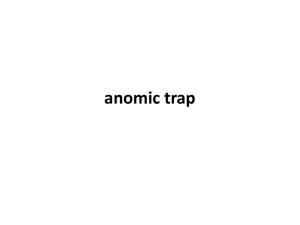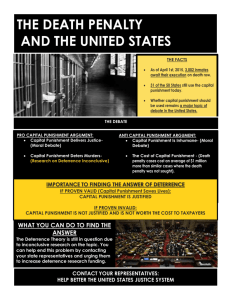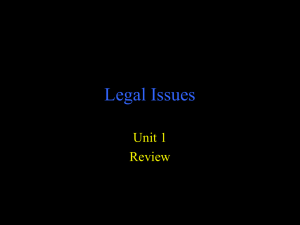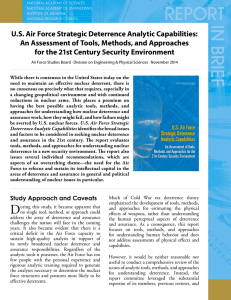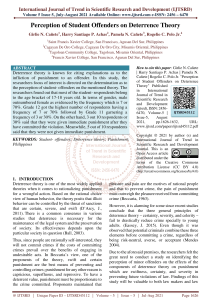Chapter 11 Promoting Peace
advertisement
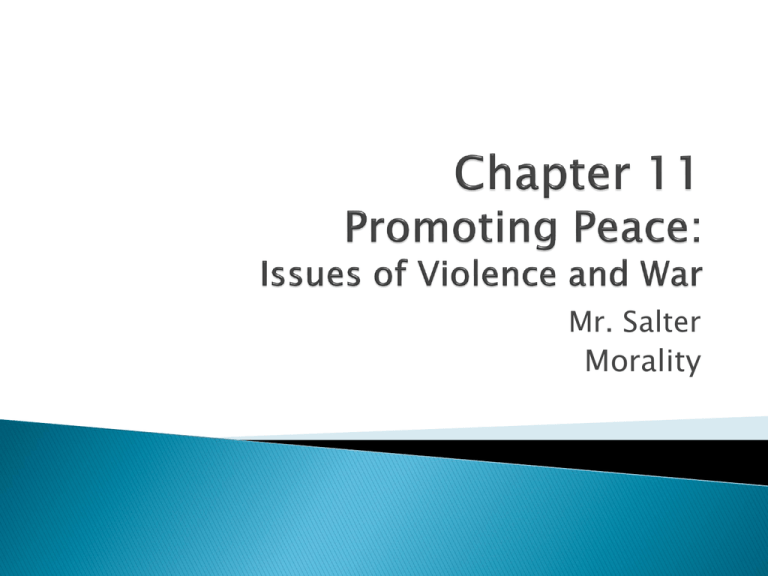
Mr. Salter Morality Pope JP II in The Gospel of Life - is the encyclical that speaks of the “culture of death” Explicit violence – a situation that someone is physically harmed or killed by direct action Hidden violence - a situation in which someone is harmed or killed indirectly because of various social factors poverty, malnutrition unjust distribution of resources (e.g., in 3rd world countries, lack of opportunity) ecological injustice illegal drugs certain kinds of sexual activity JP II (Gospel of Life) identifies four underlying causes for the violence that stains our world: ◦ Skepticism No clear standard of right and wrong, therefore anything goes ◦ Breakdown of family, community life Lack of, must fend for self; lack of discipline, character development ◦ Social and economic problems Poverty Inequality ◦ The way we view one another Indifference As enemy Righteous anger provides energy to overcome injustice and to do right; when used constructively Figure out the best way to confront the evil doer; step up and stand up for yourself If we are not willing to confront injustice, we must let the anger go How does the book describe “scandal?” ◦ Scandal is a form of murder The sin of scandal is grave when it leads others to mortal sin by deed or omission (cf. CCC 2284 Church’s stance is that Capital Punishment is acceptable only when society has no other means of defending itself (The Gospel of Life #56) Did the U.S. Supreme Court outlaw capital punishment? Yes, for a time ◦ Is Capital Punishment practiced today? Yes, by 38 states Three justifications traditionally advanced for punishment: ◦ * deterrence, * rehabilitation, * retribution, Particular deterrence - the individual who committed the crime is deterred from committing it again; General deterrence - Generally the fear of punishment inhibits people from committing certain crimes Three justifications traditionally advanced for punishment: ◦ Deterrence Particular deterrence - the individual who committed the crime is deterred from committing it again; General deterrence - Generally the fear of punishment inhibits people from committing certain crimes Rehabilitation - Punishment aimed at training and reforming wrongdoers to no longer commit crimes refers to Retribution – restores a sense of social order, declaring that certain behaviors will not tolerated The Catholic Bishops Statement on Capital Punishment call for abolition of capital punishment (do not have to memorize): a. To break the cycle of violence b. To demonstrate the unique worth and dignity of each person c. To reaffirm that God is indeed the Lord of life d. Follows example of Jesus who taught and practiced forgiveness of injustice Why even bother with what the Catholic bishops think? ◦ Their teaching is formed by the Word of God and Catholic Tradition, in which they desire to integrate Christ and the mind of God into culture. Summary “War and Respect for Life” - Human life is sacred Catholic teaching begins in every case with a presumption against war and for peaceful settlement of disputes The bishops acknowledge that war is permissible when entered into for defensive purposes Challenge of Peace: God’s Promise and Our Response Just Cause - War is permissible only to confront “a real Competent Authority - War must be declared by those and certain danger…” with responsibility for public order Last Resort- All peaceful alternatives must have been exhausted ◦ All citizens and all governments are obligated to work for the avoidance of Probability of Success- With a fair degree of certainty, intended results are like to be achieved Proportionality - The damage to be inflicted and the costs incurred by war must be proportionate to the good expected by taking up arms Non-combatants, wounded soldiers, and personnel must be respected and treated humanely Nuclear deterrence – is the proposition that when two nations possess the ability to inflict nuclear damage on each other, then neither nation is likely to use its nuclear weapons in the first place (MAD – Mutually Assured Destruction) Nuclear proliferation - an increase in the number of nations that possess nuclear weapons or that have the capability to build them The rationale for the bishops condemnation of further nuclear proliferation (do not need to memorize) 1. 2. 3. 4. It It It It doesn’t ensure peace aggravates the causes of war impedes efforts to help people in need thwarts development JP II’s 4 Pillars of Peace (215) Truth – will build peace if every individual sincerely acknowledges not only his rights, but his own duties towards others Justice – will build peace if in practice everyone respects the rights of others and actually fulfills his duties towards them Love – will build peace if people feel the needs of others as their own and share what they have with others – especially the values of mind and spirit which they possess Is this possible when terrorists are willing to use women and children as suicide bombers against other innocent people? Freedom – will build peace and make it thrive if, in the choice of the means and the ends, people act according to reason and assume responsibility for their own actions Mahatma Gandhi of India helped his country achieve independence from England without relying on violence. Civil rights leader Martin Luther King Jr. used non-violent means to combat racism Conscientious objector ◦ One who on moral of religious principles is opposed to serving in the armed forces or bearing arms Noncompliance with the draft ◦ Being a “draft dodger”; not registering for the draft or simply refusing induction into the military Selective-conscientious objection ◦ One who believes that a particular war in which he or she would be called to fight is against his moral or religious principles


